| Listing 1 - 10 of 40 | << page >> |
Sort by
|
Book
ISBN: 0199396221 0199353158 0199793662 9780199793662 129970848X 9781299708488 9780199793556 0199793557 Year: 2013 Publisher: Oxford, England : Oxford University Press,
Abstract | Keywords | Export | Availability | Bookmark
 Loading...
Loading...Choose an application
- Reference Manager
- EndNote
- RefWorks (Direct export to RefWorks)
Chronic Medical Disease and Cognitive Aging: Toward a Healthy Body and Brain explores the important and often overlooked connection between how chronic medical diseases of the body can affect cognitive function and brain health. As population demographics shift to that of an aging population it has become more important to understand and improve cognitive function in late life. Chronic medical diseases often increase the risk of cognitive impairment, and those with cognitive impairment may be less able to effectively manage their medical conditions, suggesting a reciprocal relationship may exi
Aging --- Chronic diseases. --- Diseases, Chronic --- NCDs (Noncommunicable diseases) --- Non-communicable diseases --- Non-infectious diseases --- Noncommunicable diseases --- Diseases --- Physiological aspects.
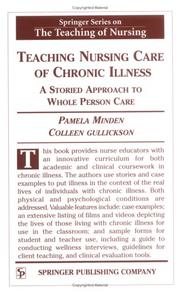
ISBN: 082612514X 9780826125149 0826125131 9780826125132 Year: 2005 Publisher: New York, NY : Springer Pub. Co.,
Abstract | Keywords | Export | Availability | Bookmark
 Loading...
Loading...Choose an application
- Reference Manager
- EndNote
- RefWorks (Direct export to RefWorks)
This text provides innovative strategies for teaching whole person care of chronic illness in both classroom and clinical settings. Taking a narrative approach, the authors show how medical-surgical and psychiatric-mental health nursing can be creatively integrated to promote student understanding of the complexity of working with clients and families experiencing long-term health challenges. The text is filled with ""how to"" information along with discussion of pedagogical concerns related to chronic illness management. Valuable features include: case examples, an extensive listing of films
Chronic diseases --- Holistic nursing --- Nursing --- Nursing education --- Medical education --- Diseases, Chronic --- NCDs (Noncommunicable diseases) --- Non-communicable diseases --- Non-infectious diseases --- Noncommunicable diseases --- Diseases --- Study and teaching.
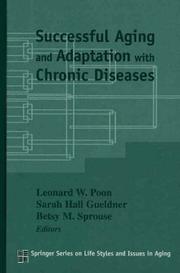
ISBN: 1281811173 9786611811174 082611976X 9780826119766 0826119751 9780826119759 9781281811172 6611811176 Year: 2003 Publisher: New York : Springer Pub.,
Abstract | Keywords | Export | Availability | Bookmark
 Loading...
Loading...Choose an application
- Reference Manager
- EndNote
- RefWorks (Direct export to RefWorks)
For many people growing old means facing one or more chronic diseases. Successful Aging and Adaptation with Chronic Diseases reviews, coalesces, and expands what we know about how older adults successfully experience the aging process and how they feel about and live with chronic illnesses. Questions considered include: How do older adults approach and deal with everyday-life when affected by multiple health problems? What kind of impact do they feel diseases have on their successful aging? How do existent models and theories of coping address these issues?. Presenting research funded by the A
Older people --- Chronic diseases. --- Diseases, Chronic --- NCDs (Noncommunicable diseases) --- Non-communicable diseases --- Non-infectious diseases --- Noncommunicable diseases --- Diseases --- Geriatrics --- Health and hygiene. --- Medical care.
Book
ISBN: 1611222753 1612099963 9781612099965 9781611222753 9781611222753 Year: 2011 Publisher: New York : Nova Science Publishers,
Abstract | Keywords | Export | Availability | Bookmark
 Loading...
Loading...Choose an application
- Reference Manager
- EndNote
- RefWorks (Direct export to RefWorks)
Chronic diseases --- Diseases --- Diseases, Chronic --- NCDs (Noncommunicable diseases) --- Non-communicable diseases --- Non-infectious diseases --- Noncommunicable diseases --- Human beings --- Illness --- Illnesses --- Morbidity --- Sickness --- Sicknesses --- Medicine --- Epidemiology --- Health --- Pathology --- Sick
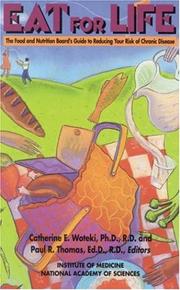
ISBN: 0309040493 9786610214495 128021449X 030956428X 0585001901 9780585001906 9780309040495 9781280214493 6610214492 9780309564281 Year: 1992 Publisher: Washington, D.C. : National Academy Press,
Abstract | Keywords | Export | Availability | Bookmark
 Loading...
Loading...Choose an application
- Reference Manager
- EndNote
- RefWorks (Direct export to RefWorks)
Nutrition --- Chronic diseases --- Public Health --- Health & Biological Sciences --- Public Health - General --- Prevention --- Nutrition. --- Prevention. --- Diseases, Chronic --- NCDs (Noncommunicable diseases) --- Non-communicable diseases --- Non-infectious diseases --- Noncommunicable diseases --- Alimentation --- Food --- Health aspects --- Diseases --- Health --- Physiology --- Diet --- Dietetics --- Digestion --- Food habits --- Malnutrition
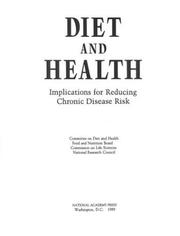
ISBN: 0309039940 9786610214341 0309588316 1280214341 058503219X 9780585032191 0309074746 9780309074742 Year: 1989 Publisher: Washington, D.C. : National Academy Press,
Abstract | Keywords | Export | Availability | Bookmark
 Loading...
Loading...Choose an application
- Reference Manager
- EndNote
- RefWorks (Direct export to RefWorks)
Chronic diseases --- Chronic Disease. --- Diet --- Health --- Nutrition --- Risk Factors --- Nutritional aspects --- Chronische ziekten en voeding --- Nutritional aspects. --- Diseases, Chronic --- NCDs (Noncommunicable diseases) --- Non-communicable diseases --- Non-infectious diseases --- Noncommunicable diseases --- Nutritionary hygiene. Diet --- Diseases --- Diet. --- Health. --- Risk Factors. --- Voedingsleer
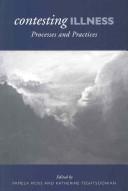
ISBN: 1442687738 9781442687738 9780802093653 0802093655 9780802095121 0802095127 9780802093656 1442692057 Year: 2008 Publisher: Toronto, [Ontario] ; Buffalo, [New York] ; London, [England] : University of Toronto Press,
Abstract | Keywords | Export | Availability | Bookmark
 Loading...
Loading...Choose an application
- Reference Manager
- EndNote
- RefWorks (Direct export to RefWorks)
The relationship between power and illness is the subject of limited discussion despite it being one of the most important issues in health-related policies and services. In an effort to correct this, Contesting Illness engages critically with processes through which the meanings and effects of illness shape and are shaped by specific sets of practices. Featuring original contributions by researchers working in a number of disciplines, this collection examines intersections of power, contestation, and illness with the aid of various critical theoretical frameworks and methodological approaches. The contributors explore experiences of illness, diagnosis, and treatment, and analyse wider discursive and policy contexts within which people become ill and engage with health care systems. Though each essay is unique in its approach, they are linked together by a shared focus on contestation as a conceptual tool in considering the relationship between power and illness. Rather than focus on a single example, the contributors address different contested illnesses (chronic fatigue syndrome and environmental illness, for instance) as well as the contested dimensions of illnesses that are accepted as legitimate such as cancer and autism. Contesting Illness offers valuable insights into the assumptions, practices, and interactions that shape illness in the twenty-first century.
Chronic diseases --- Chronically ill. --- Chronically ill --- Long-term care of the sick --- Sick --- Diseases, Chronic --- NCDs (Noncommunicable diseases) --- Non-communicable diseases --- Non-infectious diseases --- Noncommunicable diseases --- Diseases --- Social aspects. --- Government policy. --- Psychological aspects. --- Care. --- Care and treatment --- Patients --- Psychology
Book
ISBN: 1629483079 9781629483078 1629482889 9781629482880 Year: 2014 Publisher: New York : Nova Biomedical,
Abstract | Keywords | Export | Availability | Bookmark
 Loading...
Loading...Choose an application
- Reference Manager
- EndNote
- RefWorks (Direct export to RefWorks)
"Once upon a time, pediatrics was involved with infectious disease and acute disorders, but a new pattern of morbidity has emerged. Social difficulties, behavioral problems, developmental difficulties, disabilities and chronic disease have become main parts of the scope of pediatric practice. Among adults, multiple chronic disease is increasingly prevalent, whereas the prevalence of impairment and disability remain stable, but substantial and therefore, present day health professionals must be aware of disability and chronic disease. Just a few decades ago, children born with significant congenital anomalies or genetic and metabolic diseases perished at an early age and very few survived into their teens and even less into adulthood. Congenital heart disease, major errors in metabolism, cancer, cystic fibrosis and many other major diseases were fatal. Because of that, many physicians in adult primary care did not have the opportunity to see patients with these problems and thus were unable to learn how to care for them. With major advancements in medical knowledge, technology, imaging techniques, surgical skills and pharmaceutical products as well as prosthetic devices, many of these patients now live much longer lives and sometimes even close to the average life expectancy for the country, at least in the developed world. With that, a new medical care challenge has been created and we have to take a life span approach."--
Chronic diseases. --- Diseases. --- Human beings --- Illness --- Illnesses --- Morbidity --- Sickness --- Sicknesses --- Medicine --- Epidemiology --- Health --- Pathology --- Sick --- Diseases, Chronic --- NCDs (Noncommunicable diseases) --- Non-communicable diseases --- Non-infectious diseases --- Noncommunicable diseases --- Diseases
Book
ISBN: 1283400510 9786613400512 3110255685 9783110255683 9783110255218 9781283400510 6613400513 Year: 2011 Publisher: Berlin : De Gruyter,
Abstract | Keywords | Export | Availability | Bookmark
 Loading...
Loading...Choose an application
- Reference Manager
- EndNote
- RefWorks (Direct export to RefWorks)
Just a few decades ago, children born with significant congenital anomalies or genetic and metabolic diseases perished at an early age and very few survived into their teens and even less into adulthood. Congenital heart disease, major errors in metabolism, cancer, cystic fibrosis and many other major diseases were fatal. Because of that many physicians in adult primary care did not have the opportunity to see patients with these problems and thus unable to learn how to care for them. In this book, we have recruited highly qualified and experienced physicians to compile what is to the best of our knowledge, the first book dealing entirely with the issue of children's diseases in adults. Our goal is to provide a resource for all health care providers in order to help with caring for such adult patients. We believe that it will be valuable to all health care providers who provide care to adults with children's diseases. To our knowledge, there is no such resource available for practitioners which will make this book desirable.
Chronic diseases. --- Adulthood. --- Adults --- Grown-ups --- Grownups --- Age groups --- Life cycle, Human --- Diseases, Chronic --- NCDs (Noncommunicable diseases) --- Non-communicable diseases --- Non-infectious diseases --- Noncommunicable diseases --- Diseases --- Chronic Illnesses, Inner Medicine, Pediatrics, Rehabilitation.
Book
ISBN: 9780813549736 0813549736 128338308X 9781283383080 9780813547466 0813547466 9780813547473 0813547474 9786613383082 Year: 2010 Publisher: New Brunswick : Rutgers University Press,
Abstract | Keywords | Export | Availability | Bookmark
 Loading...
Loading...Choose an application
- Reference Manager
- EndNote
- RefWorks (Direct export to RefWorks)
Chronic Conditions, Fluid States explores the uneven impact of chronic illness and disability on individuals, families, and communities in diverse local and global settings. To date, much of the social as well as biomedical research has treated the experience of illness and the challenges of disease control and management as segmented and episodic. Breaking new ground in medical anthropology by challenging the chronic/acute divide in illness and disease, the editors, along with a group of rising scholars and some of the most influential minds in the field, address the concept of chronicity, an idea used to explain individual and local life-worlds, question public health discourse, and consider the relationship between health and the globalizing forces that shape it.
Chronic pain. --- Chronic diseases. --- Medical anthropology. --- Persistent pain --- Diseases --- Pain --- Diseases, Chronic --- NCDs (Noncommunicable diseases) --- Non-communicable diseases --- Non-infectious diseases --- Noncommunicable diseases --- Medical care --- Medicine --- Anthropology --- Anthropological aspects
| Listing 1 - 10 of 40 | << page >> |
Sort by
|

 Search
Search Feedback
Feedback About UniCat
About UniCat  Help
Help News
News